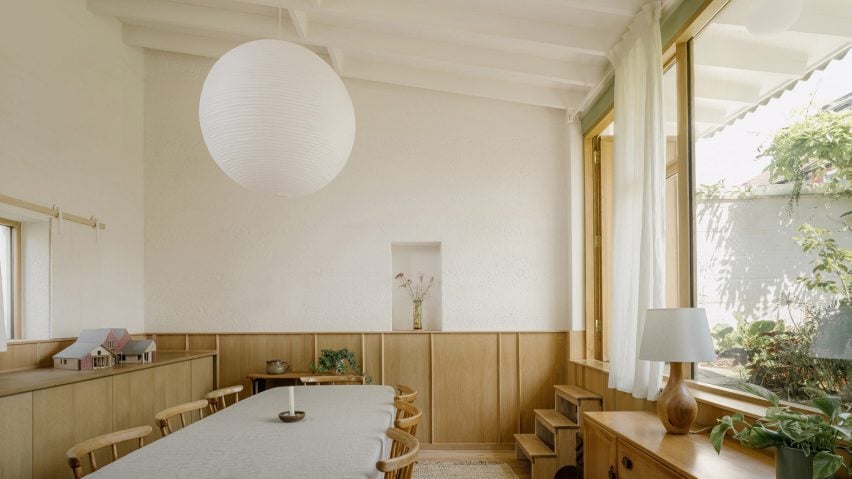London practice Commonbond Architects has designed and built its own studio at the end of a garden in Abbey Wood using a combination of hempcrete and timber.
Named Gardenhide Studio, the workspace in southeast London is intended to showcase the potential of hempcrete – a bio-composite material made from hemp and lime – as a building material.
In addition to hempcrete, Commonbond Architects used reclaimed materials and a timber frame to create the cuboidal volume, which is topped with a mono-pitched roof.
"The main idea behind the project was to create something that felt permanent and not like a standard lightweight timber shed," studio co-director Kate Nicklin told Dezeen.
"Hempcrete offered an alternative construction which was good for self-building," added Nicklin.
"We like that it can be sourced in the UK and supports small-scale growers, we like that it creates a healthy environment to be in with no off-gassing and its breathable properties, that it sequesters carbon and is ultimately biodegradable."
Though entered from the garden level, the studio is dropped a metre below ground. It is accessed by a set of wooden steps at the building's entrance, sheltered by deep beam-lined eaves.
"As you enter, you realise that the space is sunken into the ground by an additional metre," said Commonbond Architects.
"This provides a moment of unexpected delight, where the interior is not as you assumed from the outside," it explained. "The space opens up and feels extremely generous and light-filled."
Gardenhide Studio's entrance leads straight into the main workspace, which is bordered by large windows along the garden-facing edge to frame views of the flowers.
"The space was designed so that the level of the flowerbed aligns with the top of the desk, and as a result their view provides a rare perspective of being below and amongst the foliage, eye to eye with visiting animals to the garden," said the studio.
A neutral colour scheme is used throughout the interior, with light clay-painted walls and wooden panelling complemented by mid-century furniture, reclaimed materials and soft decorations.
"The other materials we decided to use resonate with the hempcrete," said studio co-director Graham Mateer. "Internal walls were painted with a breathable clay paint, and the outside is rendered with a rough lime render which is then lime washed."
At the centre of this space, a long table with a beige tablecloth acts as a casual work area. Bespoke cupboards and drawers span the back edge of the room, topped with a sink to form a kitchen and storage zone.
"The floor is made of solid elm boards which were made out of old table tops, and the roof racking board is made from painted oriented strand board which had previously been used as the formwork to cast the hempcrete," said Mateer.
Next door, the second room offers a casual seating area. It is connected to the main workspace by an open doorway and a square-shaped opening.
The seating area features a built-in L-shaped timber bench, a textured limestone fireplace and a storage platform above a small bathroom.
Other recent projects built from hempcrete include a pair of prefabricated New York guesthouses and a mews house on a derelict site in London.
The photography is by James Retrief unless stated otherwise.

